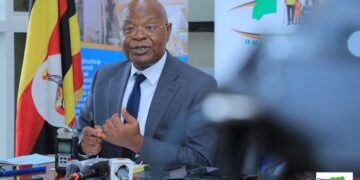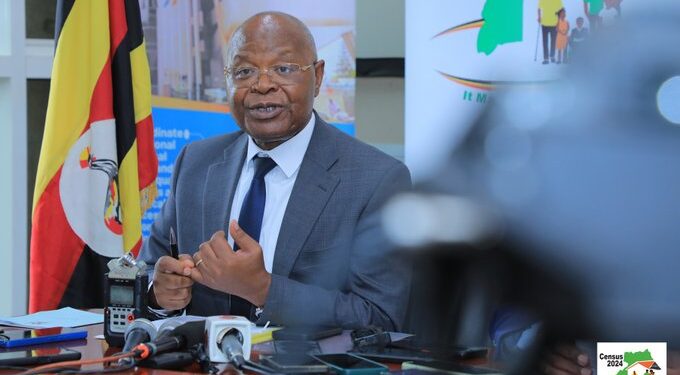The Uganda Bureau of Statistics (UBOS) will today at midnight of Thursday, May 9, 2024, take a snapshot picture of who will be and what will be happening in the country.
The UBOS Executive Director and Census Commissioner, Dr Chris Mukiza, told the press on Wednesday at Statistics House that the enumerators and supervisors who will conduct this exercise will be well remunerated.
UBOS has trained a total of 119,000 enumerators including 500 from Uganda Peoples’ Defence Forces (UPDF) to conduct the census exercise.
“Here is a breakdown of facilitation for enumerators and the various supervisors. Shs50,000 daily for enumerators, supervisors will earn Shs60,000 only per day,” he said.
“At the end of the 10 days, the enumerators will earn Shs500,000 and the supervisors Shs600,000. Allowances paid to enumerators will not be taxed because this is facilitation for the census,” he clarified.
According to Dr Mukiza, unlike in the past, this time the money paid to enumerators and supervisors will go directly to their Mobile Money accounts. The government set aside Shs89bn to pay the enumerators.
Census Night
Today, Thursday will be Census night. It’s this night that all census questions will be referred to.
According to Dr Mukiza, students at universities will be enumerated at their halls of residence using the institutional questionnaire which also applies to health facilities, among others.
He said the “floating population” for example those in transit or without a permanent address like street children will be counted tonight.
“UBOS has made arrangements to ensure everyone is counted, including those that will be travelling at night. If someone is always on the road, we will count them from their buses, and we will give them a card as a confirmation that they have been counted. We will stage roadblocks at the borders to enable enumeration,” he explained.
He said those who won’t sleep in their households while on duty like guards will be counted from where they left while going to work.
“Because people rarely pay attention to time specifics, the whole darkness period of 9th May will be taken as Census reference night. There is no place that we will not reach including prisons or Barracks. All will be enumerated.” He said by today, every enumerator will have their tablets.
“However note, that this will not affect the use, because during training, every enumerator interacted with the tablets. So, there is no need to worry.”
President Museveni declared tomorrow, Friday a public holiday to facilitate the enumerators in performing the national census exercise.
“Fellow Countrymen and, especially, the Bazzukulu. This is a reminder that the 6th National Population and Housing Census will commence this Friday, 10th May 2024,” said President Museveni in a message on X.
He added: “Please avail yourselves and provide our data collectors or enumerators with honest answers to their questions in order to enable them to process the most accurate information about you, your households, and your community.”
What is a Population Census?
A population Census is the process of counting all persons within the territorial boundaries of a given state at a given period of time. The count captures both the numbers and the characteristics of the persons. Recently, Population Censuses have also been used to capture the housing conditions of the people, hence the naming of the National Population and Housing Census (NPHC).
Is the census for only Ugandan citizens?
The census is about all persons (Ugandans and non- Ugandans) who will have spent the night in the boundaries of this country on the ‘Census Night’. The census questionnaire will take the nationality of an individual as stated by the respondent.
How often is a National Population and Housing Census carried out in Uganda?
In Uganda, a Census is normally carried out every 10 years.
Most important to note is that: The 2024 Census is the 11th Census to be carried out in Uganda, the 6th post-independence Census, the 3rd Census to be undertaken by UBOS and the 1st digital/paperless census to be conducted in Uganda.
Why should we carry out a Census?
A Census is carried out to generate benchmark data for planning at the national and lower levels. The government needs an accurate count of the population to keep track of the following aspects:
A. How many people are living in Uganda; and what are their demographic characteristics such as their age, sex, education etc
B. Where the people live such as in the Districts, Urban, semi- Urban or Rural areas.
C. How the people live such as, in permanent, semi-permanent or temporary housing units and other dwelling characteristics such as lighting sources and cooking utensils etc
D. What the people own such as assets
i.e vehicles, bicycles, television, radios etc
E. Where the people access basic social services from; for instance, the distance to the nearest school, tarmac road, police station, health facility etc.
How long does it take to complete the Census questionnaire?
The time it takes for a questionnaire to be completed varies from household to household and from enumerator to enumerator. However, under normal circumstances, a questionnaire can be completed between 45 minutes and one hour.
How is the privacy of respondents protected?
The UBOS ACT of 1998 provides for confidentiality on all data collected from any respondent. All persons carrying out a census exercise must therefore swear an oath of secrecy, to ensure that the information collected is used purely for statistical purposes.
Who is enumerated during the census?
All persons who will spend the Census Night in the boundaries of Uganda whether citizens or not will be enumerated and data captured.
What happens if I do not respond?
Although the law makes it a crime not to answer census questions, and a fine can be imposed in this case, UBOS views this approach as a last resort. Rather than emphasizing or seeking the imposition of penalties, we encourage response by explaining the importance of the questions we ask and how the information benefits the community.
Why do we have a census night and yet the Census will take 10 days? Is the enumeration going to be done at night?
There will be no counting at night; the ‘Census Night’ is only a reference point. Enumeration will take place during the day but we will be asking for the persons who slept at a given household on the ‘Census Night’. However, since we cannot reach all the households in Uganda in one day, the enumeration will take ten days i.e. from 10th– 19th May 2024.
Will Ugandans abroad participate in the Census?
Uganda opted to conduct a de-facto Census, and therefore Ugandans in the diaspora are automatically excluded. In a de-facto census, every person should be identified uniquely as a resident in one place but where they happen to be on the census night.
Will the enumerators go to lodges and hotels?
Enumerators will go to hotels and lodges. There is an instrument to enumerate people who may have spent the census night at a hotel or lodge. The enumerators will pick the information from hotel management.
What new data needs will be captured in the Census 2024 that have not been captured in any Census before?
• Data on the implementation of the Parish Development Model (PDM). The PDM is a government programme aimed at transforming the whole country into a commercial economy using a broad-based approach i.e. based at the grassroots level.
• A model of subsistence economy. In Uganda, 39% of households are outside the money economy. This data will help the government in planning interventions that will aid the transition from subsistence to the money economy.
• Questions on Clanship which aid in ascertaining the various clans that constitute the foundations of different Ugandan societies.
• Data on the day population of major cities and towns i.e. to establish the activities and engagements of the urban population during the day.
• Data on returnee migrants and emigration to establish the causes of the movement of people from time to time.
• Questions on the National Health Insurance Policy to establish the health needs and requirements of the population.
• Data on refugees. Uganda is renowned globally for hosting the biggest number of refugees. The refugees exert pressure on land and other socio-economic services.
• Data on Albinism to establish their composite number in the population and ensure they are not marginalized.
• Data on little persons in society.









